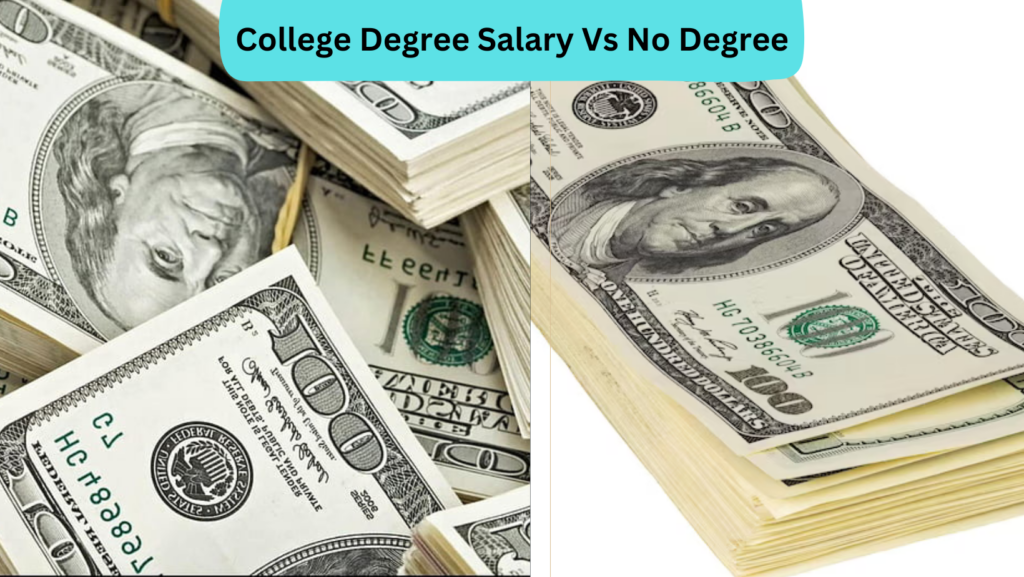In a world where education and career are intricately linked, the decision about a college degree salary Vs no degree can forge a path that addresses questions about potential earnings and future prospects.
The divergence between the earning trajectories of those armed with a degree and those navigating the workforce without one is a perplexing enigma that demands exploration. Let’s delve into the complexities of the college degree salary versus the no-degree landscape, uncovering insights that shed light on the burstiness of both choices while maintaining a keen focus on context and specificity.
Contents
- 1 The College Degree Advantage: Unlocking Earning Potential
- 2 No Degree, No Limits: Exploring Alternative Paths
- 3 What Job Pays The Most With A College Degree?
- 4 What Job Pays The Most With No College Degree?
- 5 Conclusion: College Degree Salary Vs No Degree
- 6 FAQs: Demystifying the Earning Enigma
- 6.1 Q1. Can I earn a good salary without a college degree?
- 6.2 Q2. Will not having a degree limit my growth potential?
- 6.3 Q3. Are college degrees overrated in terms of earning potential?
- 6.4 Q4. What if I’m passionate about a field that doesn’t require a degree?
- 6.5 Q5. Is the decision solely about money?
The College Degree Advantage: Unlocking Earning Potential
Why Pursue a College Degree?
A college degree is more than a piece of paper; it’s a symbol of dedication to learning, personal growth, and intellectual exploration. Pursuing a degree involves immersing oneself in a structured curriculum that provides a deep understanding of a chosen field.
It’s a commitment to acquiring specialized knowledge, critical thinking skills, and often, hands-on experience through internships and projects. The journey of earning a degree is a testament to perseverance and the willingness to tackle challenges head-on, qualities that are highly valued in the professional world.
The Earnings Escalation: The College Degree Payoff
The financial rewards of a college degree extend far beyond the investment made in tuition fees and textbooks. Statistics consistently show that individuals with a degree have the potential to earn more over their lifetimes compared to those without one.
The College Board’s “Education Pays” report underscores this point, revealing that bachelor’s degree holders tend to earn significantly higher median annual earnings compared to high school graduates. This earning gap widens with the attainment of advanced degrees, like master’s or doctoral degrees.
Beyond the tangible earnings, a college degree often opens doors to professions that offer job security, comprehensive benefits, and opportunities for career advancement. This advantage is particularly pronounced in sectors where specialized knowledge and technical expertise are critical, such as engineering, medicine, and law. The earning potential of a degree is not just about numbers; it’s about gaining access to fulfilling and meaningful careers that align with one’s passions and aspirations.
No Degree, No Limits: Exploring Alternative Paths
Breaking the Mold: Career Success without a Degree
While a college degree holds undeniable benefits, it’s important to recognize that not all career paths require one. In today’s rapidly changing job landscape, a multitude of roles value skills, experience, and a proactive attitude over formal education.
Consider the world of technology where self-taught programmers and developers can thrive, contributing to innovative projects and startups. Artists, writers, and creative professionals also often find their niche without a degree, showcasing that talent and dedication can lead to remarkable accomplishments.
The Entrepreneurial Frontier: Forging New Pathways
The absence of a degree doesn’t necessarily equate to limitations; it can be an invitation to entrepreneurship. The modern world celebrates trailblazers who leverage their creativity, resourcefulness, and determination to build businesses from the ground up.
Many renowned entrepreneurs, from Steve Jobs to Mark Zuckerberg, have disrupted industries without the formal credential of a college degree. Entrepreneurship thrives on a blend of innovation, risk-taking, and the ability to identify unmet needs in the market. In these cases, success is often driven by the courage to forge one’s own path rather than adhering to conventional norms.
What Job Pays The Most With A College Degree?
Jobs that pay the most with a college degree often fall within fields that require specialized expertise, advanced skills, and a high level of responsibility. Here are some examples of high-paying careers that typically require a college degree:
1. Medical Doctors (Physicians and Surgeons): Estimated Earnings: The earnings of medical doctors can vary significantly based on specialization, location, experience, and other factors. On average, physicians and surgeons can earn a median annual salary ranging from $200,000 to $400,000 or more, depending on their field of expertise.
2. Dentists: Estimated Earnings: Dentists also experience variance in earnings based on factors like location, experience, and practice type. On average, dentists can earn a median annual salary ranging from $150,000 to $200,000 or more.
3. Pharmacists: Estimated Earnings: Pharmacists enjoy a competitive salary range, influenced by location, years of experience, and work setting. On average, pharmacists can earn a median annual salary ranging from $120,000 to $140,000 or more.
What Job Pays The Most With No College Degree?
Several high-paying jobs do not necessarily require a college degree but often demand specialized skills, vocational training, and hands-on experience. Here are some examples of well-paying jobs that you can pursue without a college degree:
1. Air Traffic Controllers: Air traffic controllers manage the safe and efficient movement of aircraft in the skies and at airports. They require specialized training through the Federal Aviation Administration (FAA). Due to the critical nature of their work, air traffic controllers can earn a median annual salary of around $124,540.
2. Commercial Pilots: Commercial pilots fly aircraft for various purposes, including transporting passengers and cargo. While a college degree is not required, pilots need a commercial pilot’s license and extensive flight training. The median annual salary for commercial pilots is around $93,300.
3. Elevator Installers and Repairers: Elevator installers and repairers are responsible for installing, maintaining, and repairing elevators, escalators, and similar equipment. They often undergo apprenticeships or vocational training programs. The median annual salary for this occupation is approximately $88,540.
Conclusion: College Degree Salary Vs No Degree
In the dynamic interplay between a college degree salary Vs no degree salary, no definitive answer exists. The choice hinges on personal circumstances, career aspirations, and individual strengths. A college degree can offer a structured route to specialized knowledge and well-paying roles.
On the other hand, carving a path without a degree requires tenacity, resourcefulness, and a penchant for thinking outside the box. The world’s workforce is a tapestry woven with myriad success stories, each thread representing diverse choices and paths, all contributing to the complex fabric of career fulfillment.
FAQs: Demystifying the Earning Enigma
Q1. Can I earn a good salary without a college degree?
Absolutely. While a degree can provide a streamlined path to certain careers, success is achievable without one. Many industries value skills, experience, and a proactive mindset.
Q2. Will not having a degree limit my growth potential?
While a degree can open doors, career growth is influenced by various factors, including skills, networking, and a proactive approach to learning. Ambition knows no limits.
Q3. Are college degrees overrated in terms of earning potential?
Not necessarily. College degrees often equip individuals with specialized knowledge and skills, making them attractive candidates for roles with higher earning potential. However, success comes in many forms.
Q4. What if I’m passionate about a field that doesn’t require a degree?
Passion is a powerful driver. Pursuing a career aligned with your interests can lead to success. Many creative and entrepreneurial fields value skill and originality over formal education.
Q5. Is the decision solely about money?
While earnings are a significant factor, the decision should also consider personal growth, job satisfaction, and alignment with your aspirations. Balancing financial goals with fulfillment is key.






